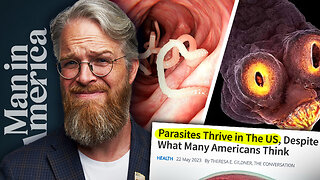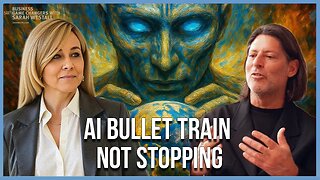Premium Only Content

Episode 3234: Unchanging God in a Changing World: Why Truth Cannot Evolve
www.catholic-reboot.com
Nightly Zoom Coordinates for Rosary:
Meeting ID: 865 8978 0399
Passcode: Wjjv4960!
Speak Lord for your Servant is Listening
Book Recommendation of the Day
here is a very strong saintly witness on exactly this theme of unchanging truth vs. modern relativism. One book in particular stands out and has been a cornerstone for Traditional Catholics:
📖 Against Heresies (Adversus Haereses) – by St. Irenaeus of Lyons (2nd century)
• Theme: St. Irenaeus wrote this monumental work to defend the Catholic faith against the Gnostic heresies of his time, which like modern relativism claimed that truth was subjective, hidden, or evolving with “new knowledge.”
• Relevance to your episode: He insists that truth is unchanging, handed down from Christ to the Apostles and through Apostolic Tradition. He shows that novelty is always a sign of heresy, while fidelity to the unbroken deposit of faith is the mark of the true Church.
• Key Quote: “For the Church, having received this preaching and this faith, although scattered throughout the whole world, yet, as if occupying but one house, carefully preserves it.”
This resonates perfectly with Archbishop Fulton Sheen’s quote: the truth cannot be different in the 2nd century, the 15th, or the 21st because God does not change.
Unchanging God in a Changing World: Why Truth Cannot Evolve
Today we reflect on a quote from one of the greatest Catholic voices of the 20th century, Archbishop Fulton J. Sheen:
“If God really is, then it is absurd to say that He is one thing in the fifteenth century and another in the twentieth. This is equivalent to saying that a thing is true at three o’clock but false at half past four and that two apples plus two apples make four apples on Monday but not on Friday. That all this should be called progress is a mystery, as if there could be progress without a fixed term.”
Archbishop Sheen pinpoints the fatal error of our age: the idea that truth itself can evolve. In a world that embraces “my truth” and “your truth,” we are told that even God’s nature and laws must adapt to the spirit of the times. But if God is real, then He is eternal, unchanging, and constant.
Let us examine this in greater depth.
Segment 1: The Nature of God as Unchanging Truth
Archbishop Sheen begins with a simple claim: If God exists, He cannot change.
Sacred Scripture echoes this:
• “I am the Lord, I change not” (Malachi 3:6).
• “Jesus Christ, the same yesterday, today, and forever” (Hebrews 13:8).
• St. James says: “Every good gift and every perfect gift is from above, coming down from the Father of lights, with whom there is no variation or shadow due to change” (James 1:17).
To suggest that God was one thing in the Middle Ages and another today is to deny His very nature. God does not age. He does not evolve. He does not bend to cultural winds. If He did, He would be less than God.
The saints understood this clearly. St. Augustine wrote: “Truth is not private property. If it is true, it belongs to all.” This means truth is eternal, not bound by time or geography.
Thus, the commandments, the sacraments, the reality of sin, the uniqueness of Jesus Christ as the one Savior these cannot change. What changes is man’s willingness to accept or reject them.
Segment 2: Modern Relativism: Truth Reduced to Preference
Sheen’s analogy of apples is simple yet devastating: to say truth changes is as absurd as saying 2 + 2 equals 4 today but not tomorrow.
This is the very spirit of relativism: the idea that truth is subjective, that morality depends on circumstance, and that doctrine must bend to culture.
We see this everywhere:
• Divorce was once universally condemned as a violation of Christ’s words: “What God has joined together, let no man put asunder” (Matthew 19:6). Now it is normalized even among Catholics.
• Contraception was condemned by every Christian denomination until the Anglicans broke in 1930. Today, it is celebrated as “responsible parenthood,” though Pope Pius XI in Casti Connubii called it a “grave sin against nature.”
• Salvation was once proclaimed boldly as found in Christ alone. Now we hear, “All religions are paths to God.” Yet Our Lord said clearly: “No one comes to the Father except through Me” (John 14:6).
Relativism does not liberate man it enslaves him. For if truth shifts with every age, then nothing is firm, nothing is secure, and nothing is worth dying for. As Sheen once quipped: “Atheism is not a creed, it is a confession of despair.”
Segment 3: Signs of the Times: Confusion in the Church and the World
Archbishop Sheen warned decades ago that the world would redefine error as progress. Today we see his prophecy fulfilled.
• In politics, natural law is rejected. Marriage, gender, and even human life are redefined by legislation. What was once universally recognized as good is now considered hateful.
• In education, truth has been replaced by ideology. Children are told they can invent their own identities, as if reality itself bends to their desires.
• In the Church, synods and conferences debate whether teachings on sin and grace should be reinterpreted for “modern man.” We hear talk of blessing unions God Himself condemns, of ordaining women, of redefining mission work as merely dialogue.
This is not progress but regression a return to the chaos of Babel, where man exalts his own will above God.
Pope St. Pius X foresaw this in Pascendi Dominici Gregis when he called modernism “the synthesis of all heresies.” Modernism insists doctrine must evolve with history. Yet this denies God’s immutability and the deposit of faith entrusted to the Church.
Thus, what we see is not growth but decay: collapsing parishes, dwindling vocations, and widespread apostasy. The more the Church tries to conform to the world, the more irrelevant she becomes.
Segment 4: The Saints on Unchanging Truth
Throughout history, the saints bore witness to truth even against overwhelming opposition.
• St. Athanasius stood nearly alone against the Arian heresy, defending Christ’s divinity. He was exiled five times but never bent. His example proves that truth is not decided by majority vote.
• St. Thomas More refused to swear allegiance to King Henry VIII’s false marriage. His words before death still echo: “I die the King’s good servant, but God’s first.”
• St. Teresa of Avila reminded her nuns: “The truth suffers, but never dies.”
• St. Augustine declared: “Right is right even if no one is doing it; wrong is wrong even if everyone is doing it.”
The saints remind us that fidelity is often lonely. But God blesses those who stand firm. Archbishop Sheen himself said: “If you do not live what you believe, you will end up believing what you live.”
Segment 5: What We Must Do
How can we respond in such times?
1. Cling to Sacred Tradition.
Read the Baltimore Catechism. Study the encyclicals of Pope Leo XIII, St. Pius X, and Pius XII. Their clarity cuts through the fog. Tradition is not nostalgia it is the voice of the Church guarding us from error.
2. Deepen Devotion.
Pray the Rosary daily. Attend the Traditional Latin Mass if possible. Frequent the sacraments. As Our Lady of Fatima said, “In the end, my Immaculate Heart will triumph.”
3. Live the Truth Boldly.
The world needs Catholics who radiate conviction. Let your family life, your work, your speech reflect Christ. When others compromise, let your steadfastness be a witness.
4. Reject False Progress.
Remember: novelty is not the same as growth. Growth in the Church comes when souls grow holier not when doctrines grow looser.
Conclusion
Fulton Sheen’s words cut to the heart of the crisis: If God is, then truth cannot change. To say otherwise is absurd, destructive, and ultimately hopeless.
Our task is not to reshape God into our image, but to reshape ourselves into His likeness. True progress is not abandoning eternal truth but conforming ever more to it.
As Our Lord promised: “You shall know the truth, and the truth shall make you free” (John 8:32).
Epistle – Isaiah 66:12–14
"As one whom the mother caresseth, so will I comfort you, and you shall be comforted in Jerusalem... and you shall see, and your heart shall rejoice, and your bones shall flourish like a herb."
Reflection on the Epistle
Isaiah gives us a picture of God’s consoling love. He speaks of a peace like a river, of comfort like that of a mother holding her child. This is not sentimental poetry it is the reality of divine providence for His people.
For the faithful remnant, this passage is a balm of hope. God does not abandon His children; He holds them close, nourishes them, and restores them.
St. Thérèse of Lisieux lived entirely in this spirit of confidence. Though she never accomplished great external works, she saw herself as a little child resting in the arms of her heavenly Father. In her autobiography Story of a Soul, she wrote: “What pleases Him is that He sees me loving my littleness and my poverty, the blind hope that I have in His mercy.”
This is the message of the Epistle: true flourishing comes not from self-reliance or worldly greatness, but from resting in God’s consoling love.
Gospel – Matthew 18:1–4
"At that hour the disciples came to Jesus, saying: Who is the greatest in the kingdom of heaven? And Jesus called a little child unto Him, and set him in the midst of them, and said: Amen I say to you, unless you be converted, and become as little children, you shall not enter into the kingdom of heaven. Whosoever therefore shall humble himself as this little child, he is the greater in the kingdom of heaven."
Reflection on the Gospel
The disciples ask about greatness; Christ answers with humility. To enter heaven, we must not become powerful, influential, or learned in worldly ways but childlike.
What does this mean? Not childishness, but childlikeness: trust, humility, simplicity, dependence. A child knows he cannot provide for himself; he relies entirely on his parents. So too must we rely entirely on God.
St. Thérèse lived this Gospel perfectly. She did not seek to be great in the eyes of the world or even within her convent. Instead, she sought to be little—to do small things with great love, to trust in God when she felt dry or forgotten, and to embrace humility in the smallest details of daily life. This “little way” has become a path to holiness for countless souls, showing that sanctity is not about grand gestures but about total trust and love.
Feast of St. Thérèse of the Child Jesus
Born in 1873 in Alençon, France, St. Thérèse entered the Carmelite convent at Lisieux at age 15. Her life was hidden, filled with ordinary acts of prayer and sacrifice. Yet her spiritual doctrine, captured in Story of a Soul, has inspired millions. Declared a Doctor of the Church by Pope John Paul II, she reminds us that holiness is accessible to all who embrace childlike confidence in God.
Her feast is a call to rediscover humility, to live in trust, and to allow ourselves to be carried by God’s love, as a child in the arms of a father.
Application for Today
• Rest in God’s love: Like the child in Isaiah’s prophecy, find peace and consolation in trusting God’s providence.
• Live spiritual childhood: Embrace humility, simplicity, and dependence on God in your daily life.
• Follow the Little Way: Offer small sacrifices and acts of love with great fidelity, knowing that nothing is wasted in God’s sight.
• Reject worldly pride: True greatness is not measured by success or recognition, but by humility and love.
Conclusionary Prayer
O God, who didst prepare for Thyself a dwelling place pure and humble in the heart of St. Thérèse, grant that by her intercession we may walk the little way of humility and trust, becoming like little children in Thy sight, so as to inherit the kingdom Thou hast promised.
St. Thérèse of the Child Jesus, pray for us.
Sacred Heart of Jesus, have mercy on us.
Immaculate Heart of Mary, intercede for us.
-
 9:25
9:25
MattMorseTV
1 day ago $15.87 earnedSupreme Court just DROPPED a NUKE.
19.1K66 -
 13:25
13:25
Nikko Ortiz
1 day agoWorst Karen TikTok Fails
21.5K10 -
 40:24
40:24
The Connect: With Johnny Mitchell
2 days ago $20.74 earnedInside The WORST Drug-Infested Slums Of Medellin, Colombia
62.7K29 -
 4:14
4:14
GritsGG
16 hours ago2 Warzone Easter Eggs! How to Find Them EASILY!
16K1 -
 LIVE
LIVE
Lofi Girl
2 years agoSynthwave Radio 🌌 - beats to chill/game to
387 watching -
 1:45:43
1:45:43
Man in America
16 hours agoThe DISTURBING Truth About Parasites — Live Q&A w/ Dr. Jason Dean
82.7K40 -
 7:13:47
7:13:47
SpartakusLIVE
12 hours ago#1 Mountain of Muscle with HUGE Legs saves your weekend from complete BOREDOMNight HYPE
49.1K1 -
 47:42
47:42
Sarah Westall
13 hours agoFreedom or Slavery? AI will Change Everything w/ Trump Senior Advisor Marc Beckman
67.5K16 -
 2:23:20
2:23:20
vivafrei
20 hours agoEp. 285: Visa Revocation No-Go! Sortor Arrested! Ostrich Crisis! 2A Win! Comey Defense & MORE!
124K116 -
 5:55:11
5:55:11
CassaiyanGaming
10 hours ago🟢LIVE - VISITING GOOB LAGOON! - Will They Rip Me Off?!? Waterpark Simulator
46.5K5
